Before I get into the list, I must admit that I once thought “craft books” were for hacks and shitty writers. I believed that ‘real writers’ didn't need them, and they just needed to write and read books. There is still some truth to this. Reading and writing a lot is the best way to build your craft, but my idea of craft books and writing being teachable changed the day I went to the Odessa Diner in the East Village for breakfast.
I sat at the counter and saw a guy going over manuscript notes. He had a book with him about writing. I could tell this guy was a pro. We started talking writing. Turns out his name was Stephen Mitchell. He was a documentary filmmaker who had just wrapped up a documentary about the band, Kings of Leon. He explained how much reading craft books had helped him because he had to shape a great 90 minute story out of over 1000 hours of footage.
We ended up meeting on Saturdays at Odessa to talk about craft. I agreed to read the books he recommended. Reading these craft books and talking about them with Mitchell was a game-changer for me. I began to see storytelling through my musician eyes, noticing that there are certain chord progressions that go better with others, and that you need to practice a lot to get better.
For this list, I am focusing on books on storytelling, but if you are interested in improving your language, here are my top 3: The Sin of Syntax, The Sense of Style, The Artful Edit. I don’t take any of these books as “gospel” and still believe rules are made to broken. But all these books have helped me profoundly with my storytelling skills.
![]() 10) 'Write Your Novel From the Middle' by James Scott Bell
10) 'Write Your Novel From the Middle' by James Scott Bell
I’ve read most of Bell’s craft books and this is his best one. Joyce Carol Oates has said she does this naturally. Bell shares why starting your story at the midpoint can help you, whether you are a pantser or a plotter. He talks about a mirror moment in the midpoint, which is really the heart of the story. Craft books are not literary bibles, but being open minded to the ideas they share can be like having an editor handy. Right now, I am working on a novel that isn’t easy. I have outlined the first act and it is solid. The second act is really cool but there is no way I can top it. This was driving me nuts until I remembered Bell’s book, and realized my first act was my second, and my second act was my third. Instead of forcing a ridiculous third act I started outlining a new first act.
![]() 9) 'No One Wants to Read Your Sh*t: Why That Is And What You Can Do About It' by Steven Pressfield
9) 'No One Wants to Read Your Sh*t: Why That Is And What You Can Do About It' by Steven Pressfield
The War of Art by Steven Pressfield is probably my favorite motivational book on writing. The idea of resistance as an energy that keeps you from your work really struck a chord with me, and it still rings true. Pressfield wrote a great follow up, giving brilliant bare bones advice on being a professional writer. I consider No One Wants to Read Your Sh*t to be an expanded version of The War of Art. Pressfield bluntly tells you why no one wants to read your shitty book. Then he gives you solutions on how to write something publishers want to publish and readers want to read. When I’m planning on revising or starting a new book I can hear Pressfield’s voice in my head saying: make sure this isn’t another shitty book that no one wants to read.
![]() 8) 'The Plot Whisper: Secrets of Story Structure Any Writer Can Master' by Martha Alderson
8) 'The Plot Whisper: Secrets of Story Structure Any Writer Can Master' by Martha Alderson
As we go through this list, you will see that the best craft books have some cringe worthy titles. Yet, this is one of the best books I’ve read on plot. Alderson really is a plot whisper. Like a good teacher, Alderson goes through the different learning styles and ways people approach a craft. This book is very effective for very right-brained writers who struggle with creating and maintaining propulsive narratives. It also provides some good exercises to deal with the mental struggles of creating a novel.
![]() 7) 'Rock Your Revisions' by Cathy Yardley
7) 'Rock Your Revisions' by Cathy Yardley
I know there are a few miracle writers who only have to write one draft of a novel. I envy them, but the best I have ever done is three drafts—not including a good copyedit afterwards, and that is before giving it to my editor for notes. Revising is a part of writing. If you don’t know what you are doing you could easily make your book worse. Yardley gives some great advice for making a scene chart and focusing on the GMCD: Goal, Motivation, Conflict, and Disaster. This book’s outlook has helped me as an editor but even more importantly, when revising or outlining a new book.
![]() 6) 'Reading Like A Writer: A Guide for People Who Love Books and for Those Who Want to Write Them' by Francine Prose
6) 'Reading Like A Writer: A Guide for People Who Love Books and for Those Who Want to Write Them' by Francine Prose
Francine Prose would probably look at all the other books listed here and say they are trash. Her craft book is definitely the most academia friendly one here. She makes this list because her book gives so many solid examples of great literary fiction, and goes into detail about why they are great. This is less helpful on plot and more about the use of language to impact the story. If you are focused on less plot-driven genres like literary fiction, this is an excellent book. It also helps genre writers see how they can use language to enhance the atmosphere, rhythm and texture of their prose.
![]() 5) 'On Writing: A Memoir on Craft' by Stephen King
5) 'On Writing: A Memoir on Craft' by Stephen King
I rarely use adverbs in my writing because of this book. Like Pressfield, this craft book is biography focused, but it feels like going on a dream road trip with one the best storytellers of the last 40 years. King gives insights into the craft: what to do to become a great storyteller, and how to use language efficiently to tell the best story. It is not only adverbs I focus on more after reading On Writing. It is also paragraphs. I still recall King talking about how to use the paragraph itself to build the scene and move the story. King knows the nuts and bolts of telling a good story and shares how he learned to fix up his.
![]() 4) 'The Art of Dramatic Writing' by Lajos Egri
4) 'The Art of Dramatic Writing' by Lajos Egri
This was the first book I talked to Stephen Mitchell about, and it is still my favorite book on character. Though it focuses on playwriting, you can write better in any genre after reading this book. It helped me understand how a tight premise can propel a story forward. The biggest thing I took away was how to view and create a character. Egri breaks it down with questions about their physical, sociological, and the psychological characteristics. Once you know the characters and how those characteristics intertwine with the premise you can create solid and believable causality to a well-told story.
![]() 3) 'Story Genius: How to Use Brain Science to Go Beyond Outlining and Write a Riveting Novel' by Lisa Cron
3) 'Story Genius: How to Use Brain Science to Go Beyond Outlining and Write a Riveting Novel' by Lisa Cron
Cron gives some interesting insight into the biological reasons behind why we love stories. Like all these craft books, it seems so simple, yet I never grasped these concepts until I read about them. The best thing about this book is that Cron shows us how we can connect to readers at the primal level. I love outlining and making notes, and this book shows a great way to organize them. After writing for a while, you start coming up with a process for starting a new book. Story Genius, like the other books on this list, is now a part of my process.
![]() 2) 'Making A Good Script Great' by Linda Seger
2) 'Making A Good Script Great' by Linda Seger
This book was the biggest game-changer for me. It reminded of when I first discovered power chords while learning guitar—simple chords I could write songs with. This book isn’t just for screenwriting, it is for any type of storytelling. I use it as a cheat sheet to write in genres from humor, non-fiction, erotica, Bizarro, to literary fiction. It showed me the most simple and effective story beats:
Setup
First Inciting Incident
Development
Second Inciting Incident
Climax
Resolution
![]() 1) 'Thrill Me: Essays on Fiction' by Benjamin Percy
1) 'Thrill Me: Essays on Fiction' by Benjamin Percy
If you are only going to read one book from this list I recommend this one. It covers similar ground as a lot of the other books, but every facet of writing from storytelling, to language, dialogue, to genre is covered. What I love about this book is it takes the best of genre and the best of literary fiction and shows us how to write a great story, no matter what milieu we are working in. I think this book captures where literature of all genres is heading, and how we can become more complete and well-rounded writers.
What are your favorite books on the craft of storytelling?

About the author
Christoph Paul is the Managing Editor and owner of CLASH Books, who have published over 60 books and have been covered by NPR, Poets & Writers, Rolling Stone, Believer Magazine, Oprah Magazine, The Observer, Fangoria, and Publisher's Weekly. The press has had books translated into Spanish, French, and Italian. He has been editing books in almost every genre for over a decade. As an author, he won a humor award and had viral cult success under a pen name. He is the lead singer and bass player of the rock band The Dionysus Effect, who have received positive reviews in Loudwire, EARMILK, and Red Rock Magazine. He sometimes writes songs about the books he publishes because even artists are inspired by their day jobs. Follow him on Twitter @christophpaul_ @clashbooks @dionysuseffect.
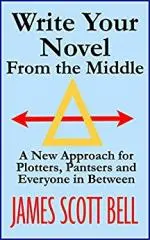 10) 'Write Your Novel From the Middle' by James Scott Bell
10) 'Write Your Novel From the Middle' by James Scott Bell
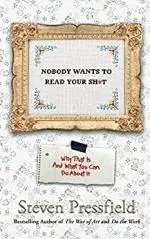 9) 'No One Wants to Read Your Sh*t: Why That Is And What You Can Do About It' by Steven Pressfield
9) 'No One Wants to Read Your Sh*t: Why That Is And What You Can Do About It' by Steven Pressfield
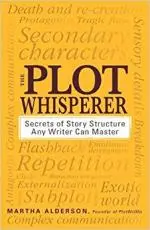 8) 'The Plot Whisper: Secrets of Story Structure Any Writer Can Master' by Martha Alderson
8) 'The Plot Whisper: Secrets of Story Structure Any Writer Can Master' by Martha Alderson
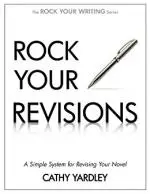 7) 'Rock Your Revisions' by Cathy Yardley
7) 'Rock Your Revisions' by Cathy Yardley
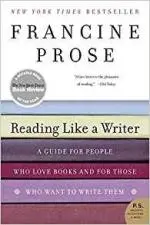 6) 'Reading Like A Writer: A Guide for People Who Love Books and for Those Who Want to Write Them' by Francine Prose
6) 'Reading Like A Writer: A Guide for People Who Love Books and for Those Who Want to Write Them' by Francine Prose
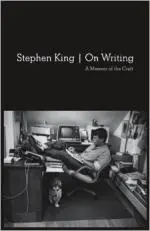 5) 'On Writing: A Memoir on Craft' by Stephen King
5) 'On Writing: A Memoir on Craft' by Stephen King
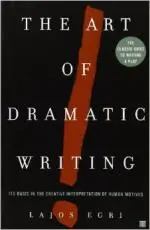 4) 'The Art of Dramatic Writing' by Lajos Egri
4) 'The Art of Dramatic Writing' by Lajos Egri
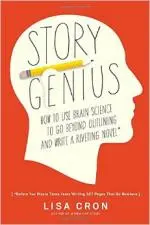 3) 'Story Genius: How to Use Brain Science to Go Beyond Outlining and Write a Riveting Novel' by Lisa Cron
3) 'Story Genius: How to Use Brain Science to Go Beyond Outlining and Write a Riveting Novel' by Lisa Cron
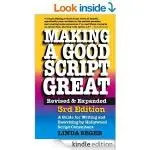 2) 'Making A Good Script Great' by Linda Seger
2) 'Making A Good Script Great' by Linda Seger
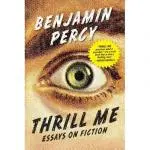 1) 'Thrill Me: Essays on Fiction' by Benjamin Percy
1) 'Thrill Me: Essays on Fiction' by Benjamin Percy








